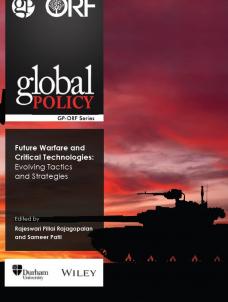
Author
Edited by Rajeswari Pillai Rajagopalan and Sameer Patil
Modern warfare has continuously evolved, with technological advancements shaping its conduct. Critical technologies like cyberspace and artificial intelligence (AI) are making new warfighting tools available, even as traditional ones like nuclear weapons are witnessing a resurgence. These changes have brought greater lethality and destruction in warfighting and blurred the lines of conflict, with direct warfare being replaced by new forms such as hybrid warfare or grey zone tactics (where the threat has diffused, and proxy actors have taken the lead).
Edited by Rajeswari Pillai Rajagopalan and Sameer Patil, the essays in this volume seek to unpack key critical technologies and explore their implications for the future of warfare. They tackle themes like cyberwarfare, challenges of attribution, swarming drones, autonomous weapons, AI, and their impact on land warfare, blockchain and nuclear weapons and space. Written by domain experts and renowned scholars, the essays answer four critical questions: Who/what are we fighting? Where are we fighting? How are we fighting? And when are we fighting?
To download the free volume as a PDF click please click here or for e-book readers please click here.
CONTENTS
Introduction
Strategic and Tactical Perspectives on Technologies
1 The Plague Beckons: On the Proliferation of Drone Swarms by Zachary Kallenborn
2 Virtual and Augmented Reality and Warfare: Fighting War as a Computer Game? by Akshat Upadhyay
3 The Future of Competition and Warfare in Cyberspace by Nishant Rajeev
4 Exploring the Utility of Blockchain in Military Operations by Meghna Bal and Mohit Chawdhry
5 Biotechnology and the Return of Biological Warfare by Shruti Sharma
6 Assessing the Military Applications of Generative AI by Amoha Basrur
7 Space and Counterspace Technologies in Future Warfare by Victoria Samson
General Strategic Perspectives
8 Should India Publicly Attribute International Cyber Incidents? by Arindrajit Basu
9 How the US Should Prepare for Space Warfare: Illustrated by Countering Rendezvous Spacecraft Threat by Brian G. Chow
10 Decoding China’s Nuclear Modernisation by Rajeswari Pillai Rajagopalan
11 The Role of Nuclear Deterrence by Tanvi Kulkarni
12 No Domain an Island: Ground Forces Need AI in Other Domains to Succeed by Michael Depp
13 ‘It was an Accident’: Implications of AI on the Ability to Distinguish between ‘True’ Accidents and Violations of International Humanitarian Law by Laura Bruun
About Editors and Authors
No comments:
Post a Comment